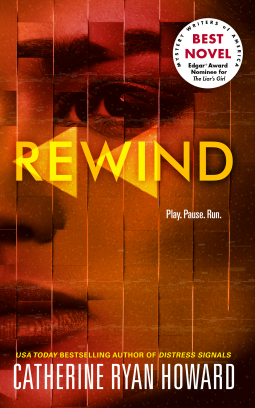
Thanks to Netgalley and Blackstone Publishing for a chance to read Rewind in exchange for an honest review.
Rewind by Catherine Ryan Howard
Genre: Psychological suspense/thriller
Publisher: Blackstone Publishing
Publication Date: September 3, 2019
Summary:
(It’s hard to know how much to reveal in this blurb without giving away spoilers. But I’ll do my best!)
Natalie, a rising Instagram star, arrives at remote Shanamore Cottages. She’s said goodbye on Instagram, saying that she needs a bit of “me time” but in reality, she’s looking for answers to questions that have shaken her faith in her life. She never returns home.
Andrew, the Cottages’ reclusive manager, is shocked by the video footage on his computer. A hidden camera in Cottage No. 6’s bedroom captures a brutal murder. Then the shadowy killer destroys the camera. But how did the killer know it was there at all? Should he report what he knows . . . and risk questions about why that camera was in the bedroom?
When Natalie doesn’t return home, her husband Mike doesn’t report her disappearance until a week after her arrival in Shanamore. He’s not even certain where she is. When he finally reports his missing wife to the police, an alert tabloid editor catches the story and hands it to Audrey, a low-level click-bait article writer, to write up the story. But Audrey is ambitious; she wants a job as a real journalist. Natalie’s disappearance is too good an opportunity to pass up. She investigates.
And slowly, the truth comes out . . .
My thoughts:
At first, I was unsure if I would like this book. The first chapter describes a bloody and vicious murder on a sleeping woman, all captured on a hidden camera. Honestly, I dislike opening with such violence before I know or care about either character. Even then, I understood that Howard had a master plan and that there were valid, good reasons for this opening, but it was still a risky strategy. My notes mentioned this, adding, Hope the payoff is worth it.
I’ll tell you straight out: it was worth it.
Here’s why:
That strategic opening
As I’d suspected, this opening was strategic. It’s the event that every other event revolves around.
The chapters are labelled rewind, pause, fast-forward, and play. The narrative skips around in time. Sometimes it fast-forwards into the future, presumably after the death. At other times, it rewinds into the past before the killing. Then it plays, once more, bringing us closer to the central events. And sometimes, it pauses to dwell on a particular character.
It was difficult for me to judge the effectiveness of the labels. Reading an e-book on my smart phone sometimes does strange things to manuscript formatting. (Not anyone’s fault. It just happens. Occupational hazard.)
But the changes in time are effective at building suspense. She knew exactly when to cut away from a scene, at the exact moment when I didn’t want it to end, and force me to fast-forward or rewind or pause. And of course, I kept reading. I had a migraine and I’d read the ending first (as I always do), but I still had to keep reading Rewind.
The perception versus reality theme
Another thing I loved was how Howard used Instagram-era obsessions.
Natalie is revealed as a social media junkie. She judges scenery by its potential for Instagram-worthy shots, gets the jitters without her phone, and knows the exact moment when she lost her signal. She’s absolutely lost without the internet. She judges all “real” things by their Internet counterpart: her walking time versus Google maps’ estimate, the scenery of Shanamore versus the images of it on the web.
No surprise, though. She’s a rising micro-influencer on Instagram with thousands of devoted and sometimes crazy followers. She makes a living off the differences between perception and reality.
Many of the characters use this, though each has different motivations. Audrey is a tabloid reporter for an online paper’s entertainment section. Actually, it’s clickbait articles, the type that exploits our cultural need to know exactly what our celebrities are doing, complete with lots of innuendo and lies.
Andrew, of course, is caught by his addiction to watching hidden camera images.
Even the architecture reminds us of a curated reality. When Natalie checks into Shanamore Cottage No. 6, she notes the floor to ceiling windows and the contrast between the inside’s neutral tones and the outside’s vivid colors. It is
“as if the floor-to-ceiling windows were screens and some amazing filter had artificially enhanced the view” (Chapter titled “Rewind 0:00:20”).
Note the irony that it’s nature that appears artificial, not the decorated living room.
A creeping sense of dread
Howard is good at developing a sense of impending doom. Dread creeps throughout the lines. The book feels claustrophobic, with the characters trapped in a warped reality that blurs with perceptions, even when describing the vast world of the internet. The plotting is well-paced.
Realistic and sympathetic characters
I liked Audrey immediately. She’s being forced to find a new place to live in less than a month, her job pays almost nothing, and her ambitions outsize her experience. When she begins investigating Natalie’s disappearance, it’s obvious that she’s out of her depth and feels awkward interviewing others. But she’s smarter than others think. I sympathized with her, even though she’s exploiting Natalie’s disappearance to gain website clicks and further her career.
It took a while to warm up to Natalie, more for personal reasons than anything else. But once I did, I felt sorrow at how her life has turned out.
And some creepy characters
Richard Flynn, Shanamore Cottages’ “handyman” with a tendency to ignore personal space conventions. Jennifer, a bed-and-breakfast manager, whose love for a married man is outsized only by her arrogance.
And then there’s Andrew.
It might sound strange to feel sympathetic toward Andrew. Most readers will hate him, I think, and understandably so. He’s a disgusting, evil person. But he also knows that he’s disgusting, even when he tries to justify his immoral actions. (Which he knows aren’t justifiable.) He isn’t sure how to live with himself, either. That small degree of self-knowledge and remorse saves him from being a caricature. And that’s what made my loathing for him tinged with sympathy.
This was a thrilling read.
It’s guaranteed to keep you reading. It might also make you rethink your social media accounts (or at least what you share on them).
Thanks again to NetGalley and Blackstone Publishing for a review copy in exchange for an honest review.
Update: I found a post on Crime Reads from Catherine Ryan Howard titled “Technology is a Crime Writer’s Best Friend” about why she includes technology & social media in her books. Terrific article.
